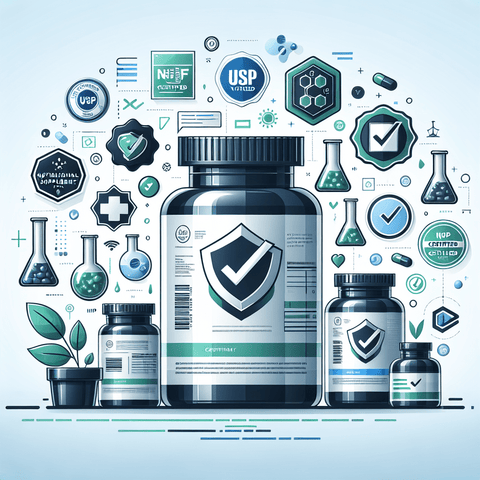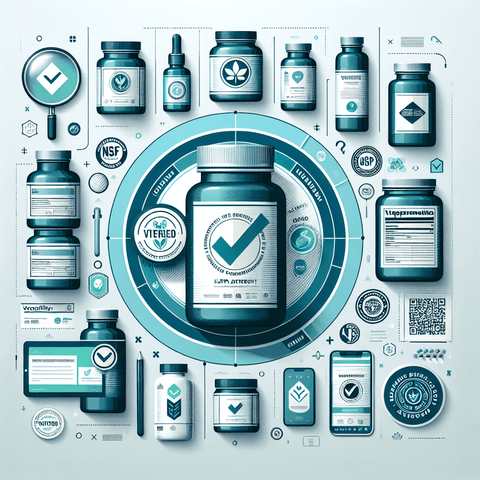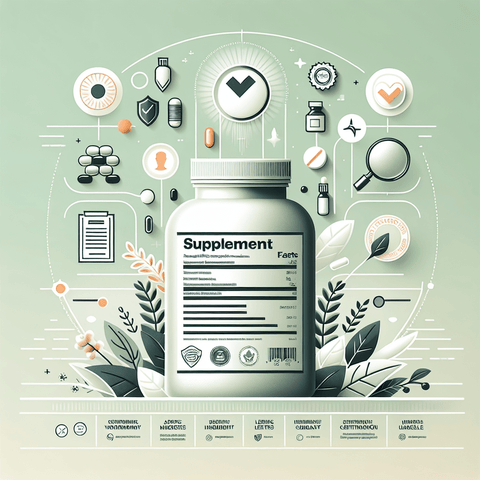Introduction
In today's health-conscious world, nutritional supplements have become a cornerstone for those seeking to optimize their well-being, fill nutritional gaps, and support specific health goals. However, with a vast array of products available on the market, consumers often find themselves overwhelmed by claims, labels, and marketing tactics that can sometimes be misleading or confusing. This is where understanding supplement certification becomes crucial. Certification serves as a mark of quality, safety, and efficacy, offering consumers a layer of confidence in their purchases. Before you add that supplement to your cart or incorporate it into your daily routine, it’s essential to grasp what these certifications mean and how they can influence your choices.
Transparency and trustworthiness are more important than ever within the supplement industry. With regulations varying by country and standards not always uniformly enforced, knowing whether a product has been independently verified can make the difference between a safe, effective supplement and one containing questionable ingredients or contaminants. In this comprehensive guide, we will explore the significance of supplement certification, the role of third-party testing, quality assurance standards, and practical tips to help you make well-informed decisions. It’s your health at stake, and understanding the certification landscape empowers you to choose products that truly support your goals.
Supplement Certification: Ensuring Quality and Safety in Nutritional Supplements
Supplement certification refers to a formal process by which independent organizations or regulatory bodies verify that a dietary supplement meets specific quality, safety, and potency standards. Certifications essentially serve as badges of trust, indicating that a product has undergone rigorous testing and meets established benchmarks for ingredients, manufacturing practices, and safety protocols. This process is vital because the dietary supplement industry is less stringently regulated than pharmaceuticals, relying heavily on manufacturer self-policing and voluntary adherence to standards.
Understanding the regulatory landscape is key to appreciating why supplement certification is so vital. In many countries, such as the United States, supplements are regulated by the Food and Drug Administration (FDA), but not with the same strict oversight as prescription medications. Manufacturers are responsible for ensuring their products' safety and accuracy, but they are not obligated to get third-party verification. Consequently, certifications from independent organizations help fill this gap by providing an unbiased assessment of a supplement’s quality.
Certification protects consumers from false claims, contaminants like heavy metals or microbial pathogens, and inconsistent formulations that can undermine effectiveness or pose health risks. For example, a supplement claiming to boost immune function should contain the ingredients listed in accurate doses, free from harmful contaminants, and manufactured under strict quality control. Certification ensures these standards are met, giving you peace of mind with each purchase.
The Role of Third-Party Testing in Validating Nutritional Supplements
Third-party testing is an essential pillar of supplement certification. It involves independent laboratories analyzing products to verify their composition, purity, and safety. These organizations are not affiliated with the supplement manufacturer, ensuring unbiased results that consumers can trust. Key organizations in this space include NSF International, USP (United States Pharmacopeia), and Informed-Choice, each maintaining rigorous standards and offering recognizable seals that can be found on supplement labels.
The testing process typically involves collecting samples directly from the market — whether from retail shelves or online orders — and analyzing them for a variety of parameters. Purity testing confirms the absence of contaminants such as heavy metals (lead, mercury, arsenic, cadmium), pesticides, or microbial pathogens like Salmonella or E. coli. Potency testing ensures that the active ingredients are present in the declared amounts, aligning with label claims. Additionally, contaminant screening assesses for substances that could be harmful to health.
Consumers benefit from third-party testing in several ways. It offers transparency, since independent labs publish detailed results and certifications. It enhances credibility, signaling to consumers that the product has been verified by an authoritative body. And it provides peace of mind, reducing the risk of consuming contaminated or mislabeled supplements. Recognized testing labs like NSF and USP offer logos that often appear on packaging—these can be easily identified and trusted indicators that quality assurance has been met.
When reading supplement labels, look for logos or statements from third-party organizations. These marks confirm that the product has passed rigorous testing standards. For example, NSF Certified for Sport is a certification specifically tailored to athletes, ensuring prohibition list compliance and contaminant-free status. Similarly, USP Verified on the label indicates the product meets USP’s strict standards for potency, purity, and quality.
Navigating Quality Assurance Standards for Nutritional Supplements
Beyond third-party testing, standards like Good Manufacturing Practice (GMP) and ISO certifications provide additional assurance of product quality. GMP, overseen by regulatory agencies such as the FDA in the United States or equivalent bodies worldwide, mandates that manufacturers follow rigorous protocols during the entire production process. These protocols include proper hygiene, equipment calibration, batch testing, and quality control procedures to ensure product consistency and safety.
ISO (International Organization for Standardization) standards, while more voluntary, set international benchmarks for quality management systems within manufacturing facilities. Certifications such as ISO 22000 focus on food safety management, ensuring that processes are in place to prevent contamination and inconsistencies. Manufacturers adhering to these standards are often viewed as more reliable providers of high-quality supplements.
When a supplement label indicates compliance with GMP or bears ISO certification, it signifies that the manufacturer adheres to stringent quality standards that impact the safety, efficacy, and stability of the products. These standards are often adopted voluntarily by reputable companies committed to transparency and quality control, serving as indicators of professionalism and reliability. Consumers should look for labels or statements indicating GMP certification, which is often mandated by law, and ISO compliance, which benefits manufacturing consistency.
To identify quality assurance standards on a label, examine the packaging for certifications, seals, or statements such as “Manufactured in GMP-compliant facilities” or “ISO 22000 certified.” In addition, checking a company’s website for their adherence to these standards can provide further reassurance when evaluating the legitimacy and reliability of their products.
Implementing Supplement Safety Measures to Protect Your Health
Reputable supplement manufacturers implement multiple safety measures to ensure their products do not pose health risks to consumers. Key among these measures is rigorous testing for contaminants like heavy metals, pesticides, microbial contamination, and potential allergens. Many companies conduct in-house testing complemented by third-party verification to maintain high safety standards.
Ingredient sourcing is another critical component of safety. Trustworthy brands establish traceability systems to track raw materials from origin to finished product. This transparency ensures ingredients are ethically sourced, free from contaminants, and compliant with safety regulations. Some companies even specify USDA Organic, Non-GMO Project Verified, or other certifications indicating their commitment to ingredient quality and safety.
Consumers can recognize safe and reliable brands by looking for labels indicating third-party testing, GMP compliance, and clear sourcing information. reviews and customer feedback can also provide insight into a product’s safety profile. When in doubt, consulting healthcare professionals or choosing products from brands with established reputations enhances safety and efficacy.
The Certification Process: From Raw Material to Retail Shelf
The process of supplement certification begins at the raw material stage. Suppliers and manufacturers verify the quality and safety of ingredients through documentation, certificates of analysis, and lab testing. As raw materials enter the manufacturing facility, they are subjected to strict quality control measures, including microbial testing, heavy metal screening, and identity verification.
Manufacturers then submit records of testing, batch certifications, and GMP compliance to regulatory agencies or third-party certifiers. These organizations review documentation, conduct their own testing if necessary, and issue seals or certificates of approval. This process ensures the final product maintains its integrity from raw ingredient to finished supplement.
Common pitfalls or red flags during certification include inconsistent labeling, missing or outdated certifications, and vague claims of quality without supporting evidence. Consumers should remain vigilant, verifying the legitimacy of certifications through official logos or databases maintained by certifying organizations.
This certification process not only safeguards consumer health but also enhances product credibility. Certified products demonstrate a manufacturer’s commitment to quality and safety, fostering consumer trust and loyalty.
Trusted Supplement Labels: Recognizing Reliable Indicators of Quality
Some of the most reputable labels and seals indicating trustworthy certification include the USP Verified mark, NSF Certified for Sport, and Informed-Choice certification. These logos are widely recognized and vetted through rigorous processes, making them reliable indicators of quality.
When evaluating supplement labels, carefully read the certification logos and ensure they are current. Outdated or vague claims should raise red flags. Remember, reputable organizations update their seals regularly, so always verify that the certification is valid and current.
In addition to visual seals, examine the label for clear ingredient lists, allergen information, and manufacturing details. Combining certification information with brand reputation and transparency about sourcing and ingredients creates a comprehensive picture of a product’s reliability.
Keep in mind that not all quality indicators are certified labels. Transparent brands often provide detailed certificates of analysis (COAs) on their websites, demonstrating their commitment to quality and safety.
Making the Informed Choice: How to Use Certification Information in Your Purchase Decision
Before purchasing a supplement, take a moment to review the certification logos and documentation. Ask yourself questions such as: Has this product been verified by a reputable third-party organization? Is the certification current and valid? Does the product’s label provide extensive ingredient and sourcing information? Combining these questions with your personal health goals and the product’s reputation helps ensure a wise investment.
Furthermore, consider the broader context: the brand’s history, customer reviews, and professional endorsements. Reputable brands often accompany their products with detailed information about their manufacturing practices and certification status. When available, consult healthcare professionals who can offer personalized advice based on your health needs.
Using certification as a baseline, always prioritize products that are transparent, independently verified, and sourced responsibly. For example, if you're seeking support for immune health, exploring supplements containing Vitamin C ([see here](https://www.topvitamine.com/collections/vitamin-c-benefits-immunity-antioxidant-energy)) with verified quality standards can be a good starting point. Similarly, for bone health, look for certified Vitamin K products. Remember, no supplement can replace a balanced diet and healthy lifestyle, but certifications ensure you’re choosing safe, high-quality options.
Conclusion
Understanding supplement certification is a critical step toward making safe, effective, and informed choices in your health journey. Certifications from reputable third-party organizations and adherence to manufacturing standards like GMP and ISO play a significant role in ensuring product quality and safety. Consumers should actively seek these marks on labels, verify their legitimacy, and consider sourcing transparency in their decision-making process. By doing so, you not only safeguard your health but also support manufacturers committed to integrity and excellence. Remember, diligent research and skepticism toward unverified claims are your best tools in navigating the complex supplement market.
Empower yourself with knowledge—choose verified, third-party tested, and certified supplements to support your health confidently and effectively.
Q&A Section
Q1: Why is supplement certification important?
Supplement certification ensures that products meet safety, potency, and quality standards. It protects consumers from contaminants, false claims, and inconsistent formulations, providing confidence in the supplements they choose.
Q2: What are some common third-party certification organizations?
Key organizations include NSF International, USP (United States Pharmacopeia), and Informed-Choice. Their logos on packaging indicate that the product has undergone independent testing and verification.
Q3: How can I identify trustworthy supplement brands?
Look for third-party certification seals, verify that certifications are current, review ingredient transparency, and check for adherence to GMP standards. Reputable brands often provide detailed certificates of analysis on their websites.
Q4: Should I only buy supplements with certifications?
While certifications are strong indicators of quality, it’s also beneficial to consider brand reputation, ingredient sourcing, and consumer reviews. Combining these factors helps you make the best possible choice.
Q5: How do certifications impact the safety of supplements I buy online?
Certifications help confirm that online products have been independently tested for contaminants, potency, and quality, reducing the risk of purchasing unsafe or ineffective products.
Important Keywords
- Supplement certification
- Third-party testing
- GMP standards
- Quality assurance
- Supplement safety
- Certified supplements
- NSF Certified
- USP Verified
- Sourcing transparency
- Certification logos
- Supplement industry standards



